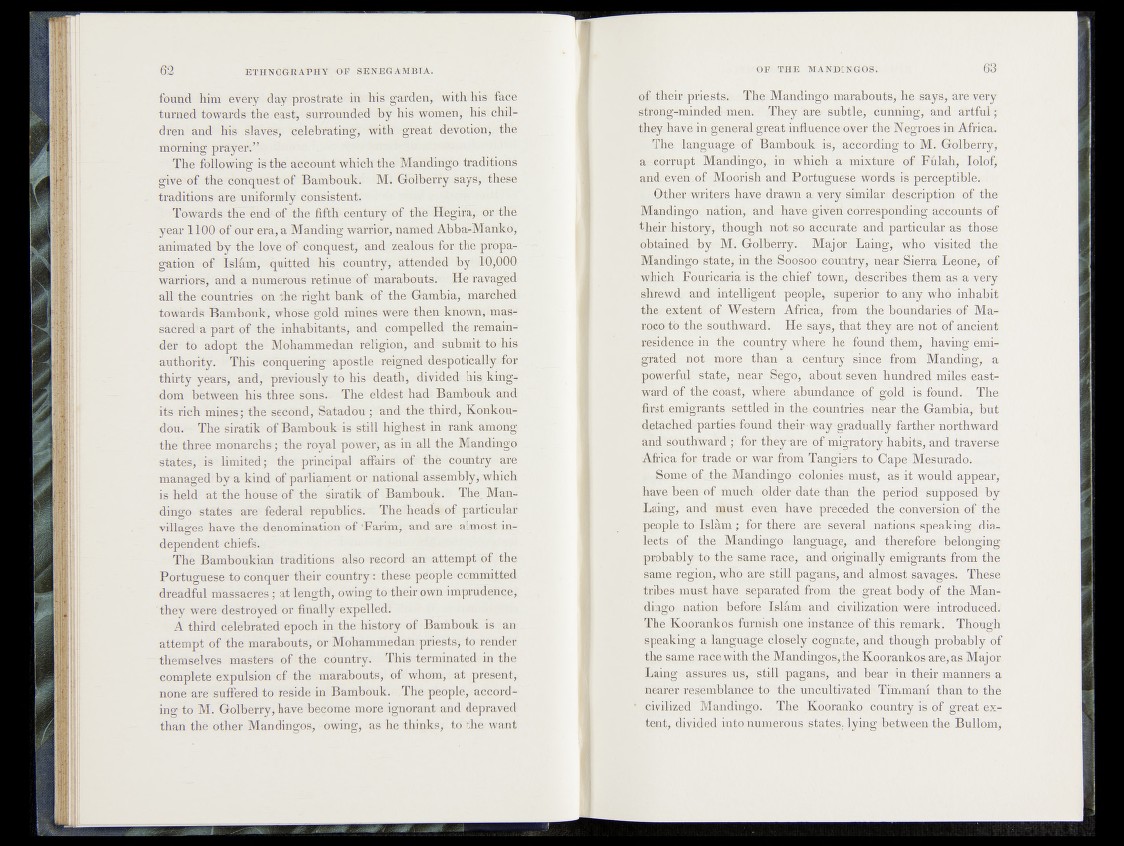
found him every day* prostrate in his garden, with his face
turned towards the. east, sbrrannded by his women) his children
and hi# slaves; celebrating, with great devotion}, the
morning prayer*.—
The following is the account which the Mandingo traditions
give'of the conqnésè of Bambouk. M. Golberry says1;. these
traditions are uniformly consistent.
Towards the endLof the fifth century of the Hegira, or the
year 1100 of our era, a Manding warrior, named Abba-dVlanko,
animated by the lo.ve ofi conquest, and zealous^for the propagation
of Islam, «jpiitted his. country, attended by 10,00.0
warriors, and a numerous retinue of marabouts^ He ravaged
all the countries on the right bank of the Gambia, marched^
towards Bambouk, whose gold mines were then known, masM*
sacred *a part of the inhabitants, and compelled the remainder
to adopt the Mohammedan religion, and submit to . his
authority. This conquering apostle reighed ‘despotically for
thirty years* and, previously to his death, divided histkfofgf
dom between his three sons. The eldest'had Bambouk and
its rich mines; the second, Satadöü ; ; and thcthird, Konkou-
dou. The siratik of Bambouk is still highest in rahk. ahasong?
the three monarch s ; thief royal power; Usdn-aU the.Mandimgo:
states;;is limited; the principal affairs of thé country, are
managed by a kind of parliament or nationalassêmbly; which
is held at the house of the siratik of Bambouk. The, ^Man-
dingo states are federal republics. The headsiof particular
villages have the denomination of Tarim, and are almost in-'
dependent chiefs. |
The BamboUkian traditions also record an attempt Of the
Portuguese to conquer their country : these people committed
dreadful massacrés ; at length, owing to their own imprudence,
they wore destroyed or finally expelled.
A third; célebrated epoch in the history of Bambouk is an
attempt of the marabouts, or Mohammedan priests, to render
themselves masters of the country. This terminated in the
complete expulsion of the marabouts, of whom, at present,
none are- suffered to reside in Bambouk. The people, according
to M. Golberry, have become more ignorant and depraved
than the other Man dingos, owing, as he thinks, to the want
of their priests. The Mandingo marabouts, he says, are very
strong-minded mem They are subtle, cunning, and artful;
theyhavaimgeneral great influencei over the Negroes in Africa.
■ The language-o‘f Bambouk is, according to M. Golberry,
a- corrupt Mandingp;. in which a mixture of Fulah, Iolof,
and. evemof Moorish and Bocfeugjiese words-is perceptible. !
f.: QtheiM writers have drawn a; .very similar; description of the
Mandingo nation, and. have «giveneporresponding accounts of
their-history, though no# so- accurate and. particular as those
obtained! by; M-. Golberry. Major Laing, who visited the
Mandingo state, in the. Soosoo country, near Sierra Leone, of
which Fouricaria is the chief tow-n, describes them as a /very
shrewd. and intelligent- people; superior to- any wbb‘ inhabit
the extent, of Western Africa, from fSe^bdnndaries of Ma«-
roeo to the. southward. He -says, that ‘they are) notiof ancient
reside^cgiin thqopountry where he found them, having emi-
. grated not igore than a century 'since from4 Manding, a
.powerful’ state, near - Sego, abbut;: seven hundred miles eastward
of the coast, where abundance, olgpld^is, found. The
fi.rgt.grqigrants setiled in the. countries.: near the. Gambia,= but
detachedparties-found their -way * gradual 1 y: farther northward
and Iquth’ward ; for they'are of migratory habits, and traverse
Africa for trade or war from Tangiers to l^pg^iyiesurado.
s*,:. .Some of. the Mandingo colonies must, as it would appear,-
have been of much older date than the period 'supposed* by
Laing, and must even, have preceded the conversion of the
people to Islhm; for there are several nations speaking dia?
leets of, the Mandingo language, and ; therefore belonging
probably to the same race, and originally emigrants from the
same region, who are still pagans, and almost savages. These
tribes must have, separated.from the great body of the Mandingo
nation$ before Islam and. civilization were|introduced}
The Koorankos furnish one instance of this remark. Though
speaking a language clB|ely. cognate, and though probably of
the sarne race with the Mandingos,the J^oorankos arenas Major
Laing assures, us,- still pagans, and. bear in their manners a
nearer resemblancfii to the uncultivated^ Timnaani than to the
civilized Mandingo. The Kooranko country is of great extent,
divided into numerous states, Jying->befween.the Bullom,